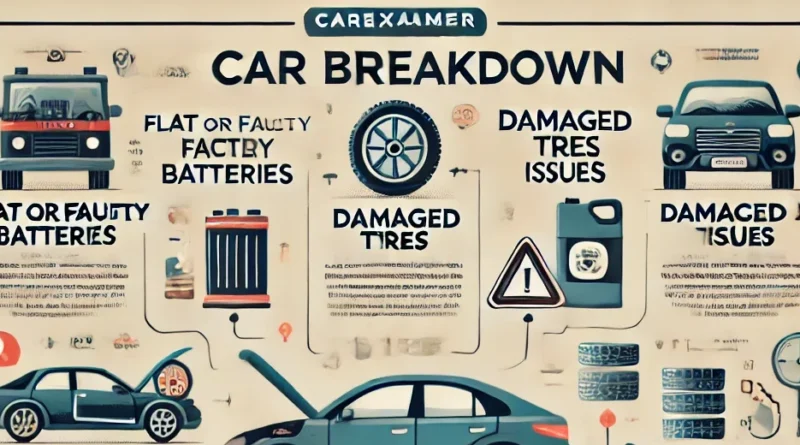Most Common Car Breakdowns and How to Prevent Them
In this article lets have a look on most common car breakdowns and how to prevent them only thing you have to do is to keep eye on basic stuff more to avoid long term or unnecessary problems short term or long term.
1. Flat or Faulty Battery Flat or faulty batteries are the top cause of car breakdowns, particularly during the colder months. These issues often arise from underuse, frequent short trips, or poor electrical connections. Here’s what typically leads to battery failures:
- Infrequent vehicle use or short driving distances.
- Defective vehicle components or charging systems.
- Inherent battery defects or simply its age (5 year average battery life) .
Preventing Battery Issues:
- Always turn off all electronics when exiting the vehicle. While many cars have a warning sound for lights left on, it’s best to double-check.
- Regularly charge the battery if your car is seldom used for long trips. Consider a Battery Maintainer for easy maintenance.
- Ensure your garage checks and secures all connections and that the battery terminals are clean during regular services.
- Note that car batteries typically come with a 3-5 year warranty, so consider replacement to avoid unexpected failures.
2. Damaged Tyres and Wheels Punctures are common and can be quite frustrating. They usually result from sharp objects on the road, but other factors include:
- Damage to the tyre’s valve.
- Impact with curbs or deep potholes.
- Age-related wear and tear(average 4-5years and needs tyres as they perishing with low mileage cars).
Avoiding Tyre Damage:
- Regularly check the depth and pressure of your tyres, including the spare.
- Inspect tyres for age-related deterioration, which increases the risk of blowouts.
- Avoid potholes and ensure your wheels are properly aligned to prevent uneven wear.
3. Engine Oil Issues Incorrect engine oil levels can severely damage your engine. Overfilling is as dangerous as having too little oil, especially in diesels with a Diesel Particulate Filter (DPF), where oil may become diluted if DPF regeneration is incomplete.
Maintaining Proper Engine Oil Levels:
- Regularly check your oil level with the dipstick, ensuring it’s between the indicated marks.
- Use the correct oil type as specified in your vehicle handbook.
- Change your oil as recommended to avoid dilution and degradation.
4. Timing Belt or Chain Failures Timing belts and chains are crucial, and their failure can lead to significant engine damage. Regular checks and replacement at prescribed intervals are vital any audible noise visit your local mechanic asap.
Preventing Timing Belt or Chain Issues:
- Ensure regular service checks on the timing belt or chain.
- Maintain proper oil levels and quality.
- Be attentive to any unusual engine noises, which could indicate wear.
5. Alternator Faults Issues with the alternator can lead to persistent battery problems and dim headlights. If the alternator or water pump belt breaks, it can cause immediate temperature rises and serious engine damage.
6. Misfuelling Putting the wrong type of fuel in your car is a common mistake. To prevent this:
- Always double-check the fuel type before filling up.
- Remember: Green nozzle for petrol, black for diesel. Diesel nozzles are typically larger to prevent misfuelling into petrol vehicles.
7. Overheating Overheating can cause breakdowns and serious engine damage. Regularly check and top up your coolant, and ensure there are no leaks in your cooling system.
8. Lost or Locked-In Keys Losing your keys or locking them inside the vehicle can be distressing and inconvenient.
- Keep a spare key at home.
- Modern keys with microchips may require professional assistance or a dealer visit for replacement.
Summary Regular maintenance, vigilant inspection of key components like batteries, tyres, and engine oil, and cautious driving can prevent most common breakdowns. Always be prepared and know what your vehicle requires to stay in optimal condition. For comprehensive assistance and cover, consider subscribing to a breakdown cover service to mitigate the impacts should any of these common issues occur.
Buying a used VW. Buying used vauxhall, BMW, Jaguar, Ford, Volvo, Range rover, Bentley, Aston Martin, Porsche, Ferrari, Lamborghini, Maserati, Hyundai, Tesla, Honda, Pagani

